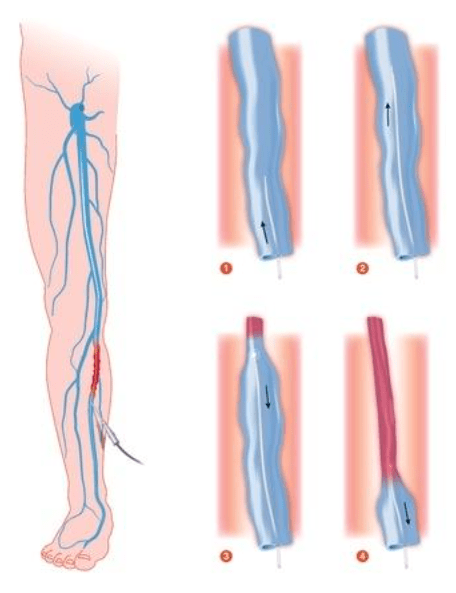RADIOFREQUENCY ENDOVENOUS ABLATION
What is Radiofrequency Venous Ablation (RFA)?
Radiofrequency venous ablation (RFA) is a minimally-invasive treatment aimed at improving or eliminating the symptoms of varicose veins in the legs. Unlike traditional surgical methods, RFA is performed using needle access without the need for a surgical incision.
At our clinic, we utilize the Covidien ClosureFast device for this procedure.

Radiofrequency Venous Ablation
Typical Technique
How Does Radiofrequency Venous Ablation Work?
During RFA, a radiofrequency system employs radio waves to generate thermal energy. This energy heats up the inside of the targeted vein, effectively destroying its endothelial lining. As a result, the vein becomes non-functional and collapses immediately. This collapse reduces pressure on downstream varicose veins, alleviating your symptoms.
Your body naturally redirects blood flow through other healthy veins, enhancing the efficiency of the entire venous system.
Steps to Radiofrequency Venous Ablation (RFA) Technique
1. An ablation probe is carefully inserted into the great saphenous vein.
2. The probe is positioned accurately using ultrasound guidance to ensure precise treatment.
3. The probe is activated, and radiofrequency energy is applied to the vein, initiating the ablation process.
4. The probe is gradually pulled back along the length of the vein, treating the desired area until the entire segment is effectively ablated.
Which Vein Does Radiofrequency Treat?
Does Radiofrequency Ablation Require Anesthesia?
No, most radiofrequency ablation (RFA) procedures are performed in our Fox Valley Surgical Specialists clinic under mild sedation and local anesthetics. This approach ensures patient comfort while allowing for a minimally invasive treatment experience. In certain cases, such as patients requiring extensive microphlebectomies, we may opt to perform the procedure in a hospital setting with anesthesia to ensure optimal patient safety and comfort.
Your Experienced Vascular Team

Robert Ballard, MD



